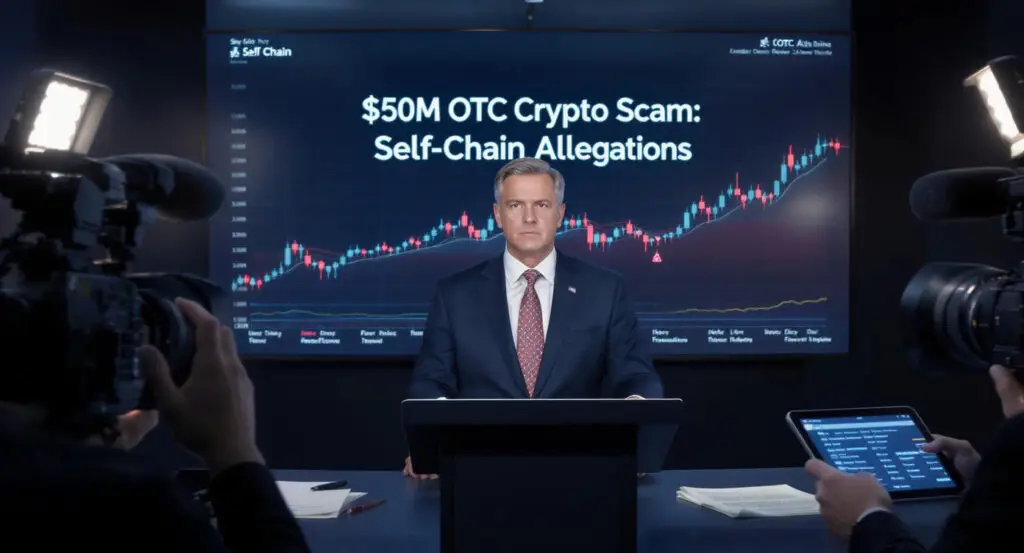As allegations of a $50 million over-the-counter (OTC) crypto scam ripple across the blockchain community, Self Chain founder Ravindra Kumar has publicly denied involvement in the fraudulent schemes that allegedly targeted investors with fake token allocations tied to leading blockchain projects.
“I’ve been accused of serious wrongdoing, which is completely false,” Kumar said in a post on X (formerly Twitter) on Friday. “My legal team and I are working on a statement to address this matter.” The post was issued amid mounting online speculation that Kumar was the individual referred to as “Source 1,” the purported orchestrator of a months-long scam operation selling vested tokens that never existed.
Fraud Allegations Surface Through OTC Broker’s Confession
The accusations gained traction following a public disclosure by Mohammed Waseem, CEO of Aza Ventures, a well-known Indian OTC broker. In a message posted to Telegram on Thursday, Waseem revealed that his firm had been unwittingly used as a middleman in dozens of fraudulent deals involving large allocations of tokens from prominent crypto projects.
“We have been scammed,” Waseem wrote. “There is no easy way to say it, but it is what it is.” He explained that the fraudulent offers originated from a contact he referred to as “Source 1,” who initially facilitated what appeared to be legitimate deals offering vested tokens from high-profile crypto projects such as Sui, Near, Axelar, and Sei at discounted rates.
However, Waseem said the transactions gradually evolved into full-blown Ponzi schemes. When it came time to deliver the tokens, Source 1 repeatedly delayed transfers, prompting frustrated buyers to raise red flags.
“I did not do this knowingly,” Waseem told investors. “I have been taken for a ride myself.” He claimed to have exhausted his personal funds in an attempt to keep distributions going, hoping that Source 1 would eventually come through with payments.
Industry Warnings Ignored
Long before Waseem’s admission, several blockchain project leaders had issued public warnings about fraudulent OTC token offerings.
In May, Adeniyi Abiodun, co-founder of Mysten Labs, the team behind the Sui blockchain, warned followers on Telegram, X: “Stop falling for scammers selling you OTC deals. There is NO deal.”
Later that month, Lucian Mincu, co-founder of MultiversX, posted similar alerts, flagging suspicious activity around phantom OTC offerings involving his project’s tokens.
Even Smokey The Bera, the pseudonymous founder of Berachain, said he had informed Waseem that no legitimate OTC deals existed involving the chain’s native BERA token. “He insisted that his sources were good and wouldn’t cooperate with any investigation,” Smokey noted.
Despite these repeated warnings, the scam proliferated across Telegram and other peer-to-peer trading platforms, attracting high-net-worth investors eager for early-stage token allocations promising outsized returns.
OTC Deals: Opportunity and Risk
The incident highlights growing risks in the OTC crypto trading space. Unlike centralised exchange trading, OTC deals involve direct transactions between parties, often without formal escrow or regulatory oversight. These deals are especially common when buying large or illiquid tranches of vested crypto assets not yet fully unlocked for public trading.
The lure of discounted access to tokens from major projects has long made OTC markets attractive to wealthy investors. But as this scandal shows, the same lack of transparency that facilitates deal-making can also make the space fertile ground for fraud.
Refunds Promised, but Uncertainty Remains
Waseem has pledged to refund investors affected by the scam, although it remains unclear how he plans to do so. He said that Source 1 had promised to begin returning funds by the end of June and added that Indian authorities had confirmed the operation was a Ponzi scheme. According to Waseem, authorities have also committed to helping facilitate the refund process.
Still, confidence remains shaky. With Kumar’s denial now in the public domain and his apparent confirmation that he is the individual at the centre of investor suspicion, the saga continues to unfold in real time, leaving investors anxiously awaiting accountability and restitution.
For now, one lesson is clear: in the fast-moving world of crypto, even experienced players are not immune to deception, especially in the opaque world of OTC token trading.























